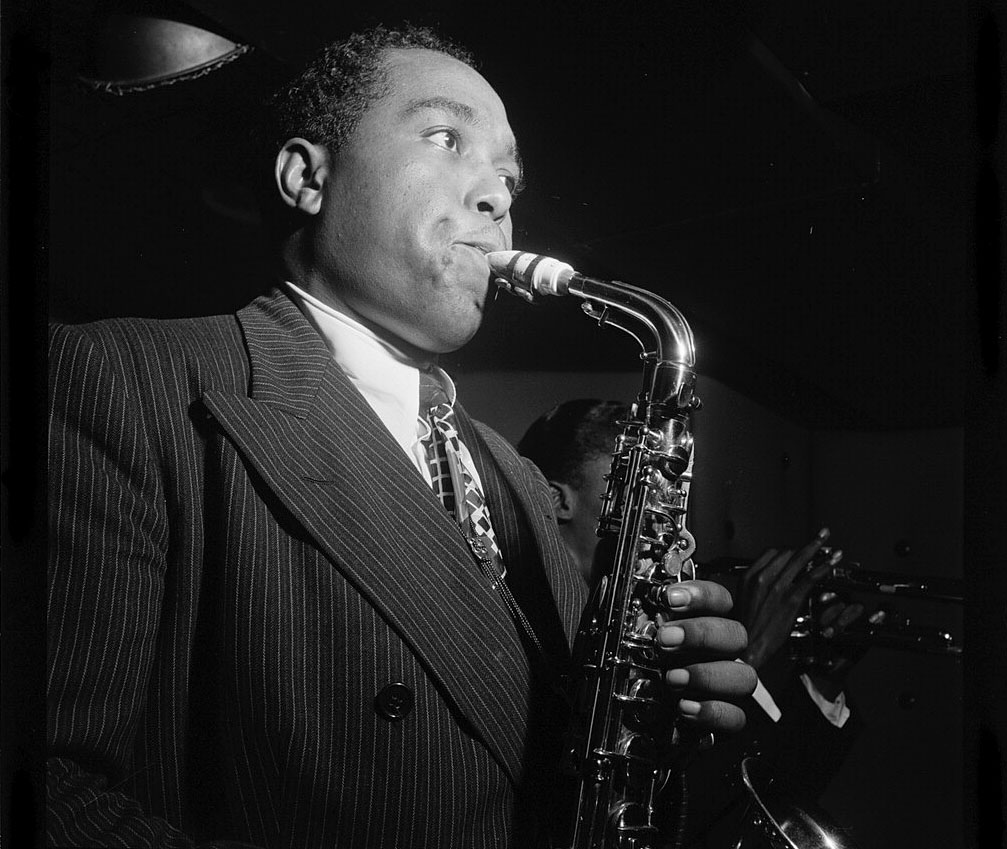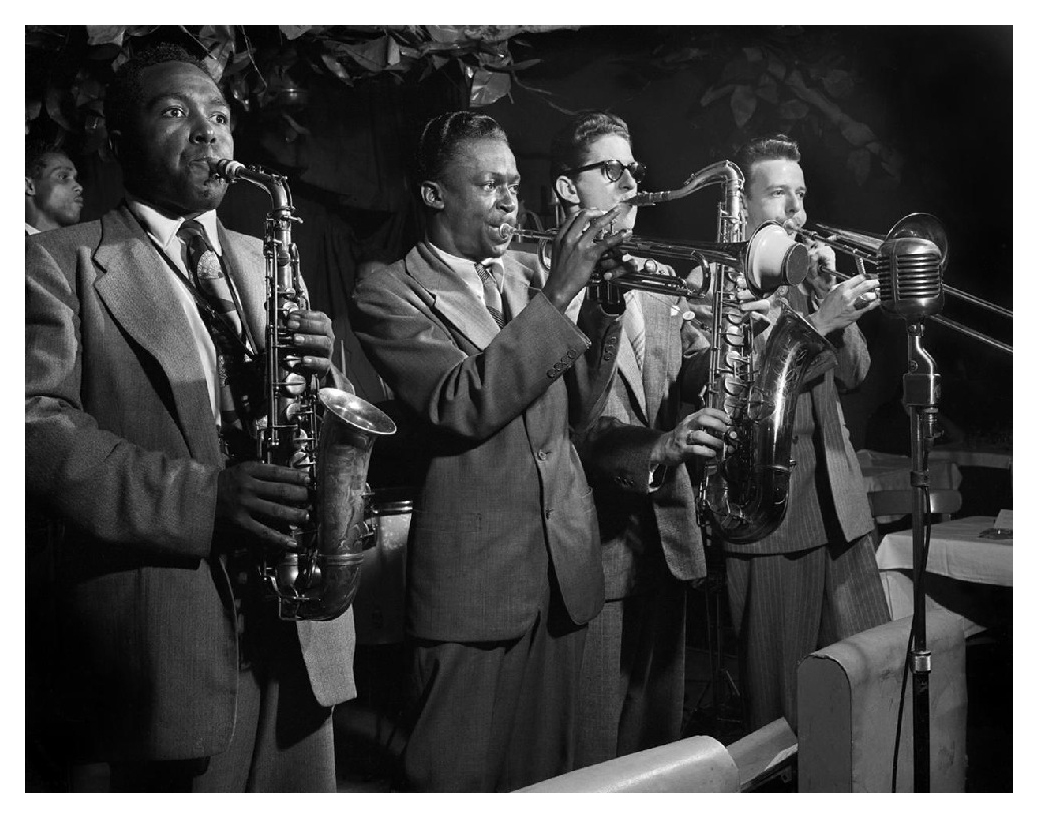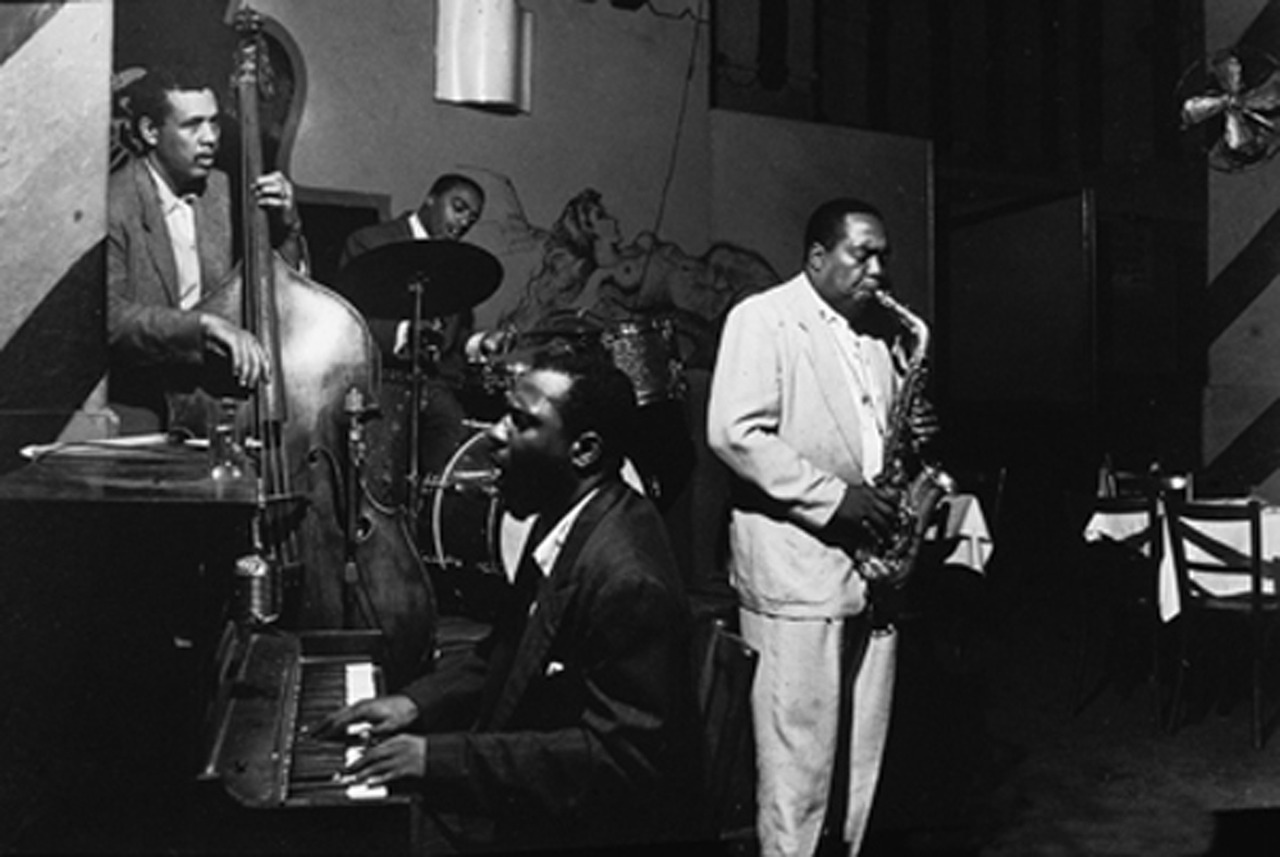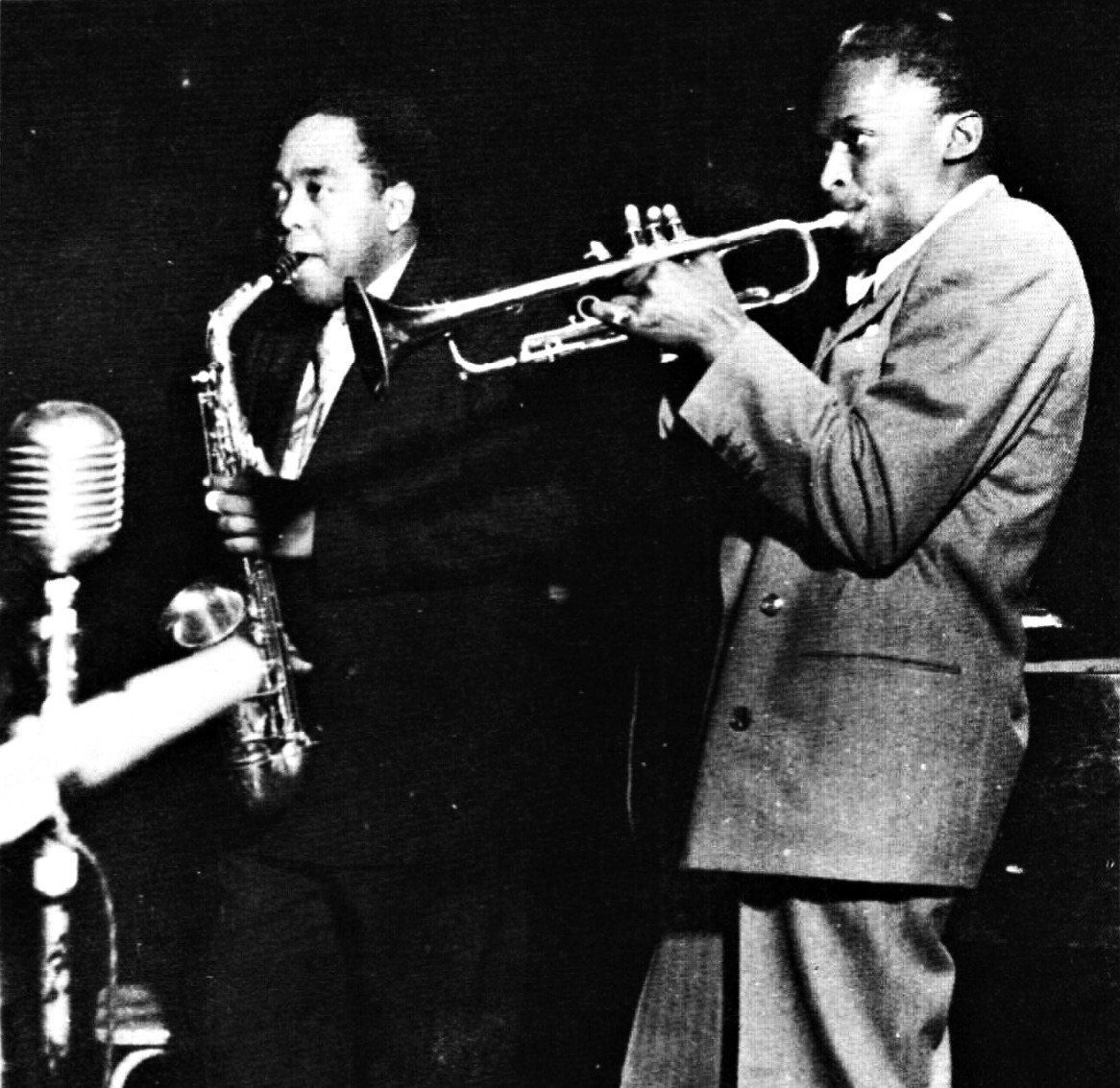(Boston radio, early 1954)
C.P.= Charlie Parker P.D.= Paul Desmond J.M.= John McLellan (Fitch)
P.D.- that music because there's many good people playing in that record but the style of the alto is so different from anything else that's on the record or that went before. Did you realize at the time the effect you were going to have on Jazz-that you were going to change the entire scene in the next ten years?
C.P. - well let's put it like this: no. I had no idea that it was that much different.
J.M. - I'd like to stick in a question, if I may. I'd like to know why there was this violent change, after all - up until this time the way to play the alto sax was the way that Johnny Hodges and Benny Carter played alto, and this seems to be an entirely different conception, not only of how to play that particular horn, but of music in general.

P.D. - yeah, how to play any horn.
C.P. - yeah, that I don't think there's any answer to...
P.D. - like the way you were speaking, John.
C.P. - that's what I said when I first started talking, that's my first conception, man, that's the way I thought it should go, and I still do. I mean music can stand much improvment. Most likely in another 25, or maybe 50 years some youngster will come along and take the style and really do something with it, you know, but I mean ever since I've ever heard music I've thought it should be very clean, very precise - as clean as possible anyway - you know, and more or less to the people, you know, something they could understand, something that was beautiful, you know. There's definitely stories and stories and stories that can be told in the musical idiom, you know. You wouldn't say idiom but it's so hard to describe music other than the basic way to describe it - music is basically melody, harmony and rhythm - but I mean people can do much more with music than that. It can be very descriptive in all kinds of ways, you know, all walks of life. Don't you agree, Paul?

P.D. - yeah, and you always do have a story to tell It's one of the most impressive things about everything I've ever heard of yours.
C.P. - that's more or less the object. That's what I thought it should be.
P.D. - another thing that's been a major factor in your playing is this fantastic technique, that nobody's quite equaled. I've always wondered about that, too - whether there was - whether that came behind practicing or whether that was just from playing, whether it evolved gradually.
C.P. - well,you make it so hard for me to answer you, you know, I can't see where there's anything fantastic about it all. I put quite a bit of study into the horn, that's true. In fact the neighbors threatened to ask my mother to move once when we were living out West. She said I was driving them crazy with the horn. I used to put in at least 11 to 15 hours a day.
P.D. - yes, that's what I wondered.
C.P. - that's true, yes. I did that for over a period of 3 to 4 years.
P.D. - Oh - yeah. I guess that's the answer.
C.P. - that's the facts anyway. (chuckle)
P.D. - I heard a record of yours a couple of months ago that somehow I've missed up to date, and I heard a little 2 bar quote from the Klose book that was like an echo from home...

C.P. - yeah, yeah. Well that was all done with books, you know. Naturally, it wasn't done with mirrors, this time it was done with books.
P.D. - well that's very reassuring to hear, because somehow I got the idea that you were just born with that technique, and you never had to worry too much about it, about keeping it working.
J.M. - you know, I'm very glad that he's bringing up this point because I think that a lot of young musicians tend to think that...
P.D. - yeah, they do. They just go out...
J.M.- It isn't necessary to do this.
P.D. - and make those sessions and live the life, but they don't put in those 11 hours a day with any of the books.
C.P. - oh definitely, study is absolutely necessary, in all forms. It's just like any talent that's born within somebody, it's like a good pair of shoes when you put a shine on it, you know. Like schooling brings out the polish of any talent that happens anywhere in the world. Einstein had schooling, but he has a definite genius, you know, within himself, schooling is one of the most wonderful things there's ever been, you know.
J.M. - I'm glad to hear you say this.
C.P. - that's absolutely right.
P.D. - yeah.

C.P. - well?
P.D. - what other record?
C.P. - which one shall we take this time?
J.M. - I want to skip a little while. We, Charlie, picked out "Night and Day", that's one of his records. This is with a band or with strings?
C.P. - no, this is with the live band. I think there's about 19 pieces on this.
J.M. - Why don't we listen to it then, and talk about it?
P.D. - Charlie, this brings us kind of up to where you and Diz started joining forces, the next record we have coming up. Where did you first meet Dizzy Gillespie?
C.P. - well, the first time, our official meeting I might say, was on the bandstand of the Savoy Ballroom in New York City in 1939. McShann's band first came to New York, I'd been in New York previously but I went back West and rejoined the band and came back to New York. Dizzy came by one night, I think it was the time he was working with Cab Calloway's band and he sat in in the band. I was quite fascinated with the fellow, and we became very good friends and until this day we are, and that was the first time I ever had the pleasure to meet Dizzy Gillespie.
P.D. - was he playing the same way then, before he played with you?
C.P. - I don't remember precisely I just know that he was playing, what you might call in the vernacular of the streets, a boo-koo of horn, you know.
P.D. - boo-koo horn?
C.P. - yeah.
P.D - ok.

C.P. - you know, just like all the horn packed up at once, you know.
P.D. - right.
C.P. - and we used to go around different places and jam together. We had quite a bit of fun in those days, and shortly after McShann's band went West again I went out with them and I came back to New York again I found Dizzy again, in the old Hines' organization in 1941 and I joined the band with him. I was in New York, I. we, both stayed on the band about a year. It was Earl Hines and Dizzy Gillespie, Sarah Vaughn, Billy Eckstine, Gail Brockman, Thomas Crump. There was Shadow Wilson, quite a few names that you'd recognize in the music world today you know, were in that band.
P.D. that's quite a collection.
C.P. - and that band broke up in '41. In '42 Dizzy formed his own little combination in the Three Deuces, in New York City and I joined his band there and that's one of the records you're about to play now - we made these in '42 in New York.
P.D. - yeah, I guess the first time I heard dig group was, you came out to Billy Berg's?
C.P. - oh yes but that was '45, that was later - we'll get to that.
P.D. - I'm just illustrating how far I was behind all this.
C.P. - oh, don't be that way - modesty will get you nowhere.
P.D. - I'm hip. (laughter)
J.M. - so shall we spin this1942 one?
P.D. - yeah.

J.M. - Ok this is "Groovin' High" with Dizzy and Charlie.
J.M. - I guess this is Slam Stewart and Remo Palmieri I guess and I don't know who is on piano.
C.P. - yes I think that was Clyde Hart.
P.D. - yes I think so,
C.P. - and Big Sid Catlett - deceased now.
P.D. - you said at that time New York was jumping in '42.
C.P. - yeah, New York was; well those days were what you might all the good old days, you know Paul?
P.D. - oh yeah.
C.P. -gay youth.
P.D. - tell me about it.
C.P. - well, descriptively, just like I was going to say-gay youth, lack of funds.
P.D. - listen to grandfather Parker talking here.
C.P. - there was nothing to do but play, you know and we had a lot of fun trying to play, you know, I did, plenty of jam sessions, much late hours, plenty of good food, nice clean living, you know, but basically speaking - much poverty.
P.D. - that's always good, too - no worries.
C.P. - it has it's place, definitely, in life.
P.D. - would you like that sort of situation to have continued indefinitely?
C.P. - well, whether I liked it or not, it really did Paul; I'm glad it finally blew over of a sort, and I do mean of a sort.
P.D. - yes.

C.P - yeah I enjoy this a little, much more in fact, in having the pleasure to work with the same guys of the sort that I've met, and I've met other young fellows, you know, that come along. I enjoy working with them when I have the pleasure to. If I might say you, yourself, Paul.
P.D. - oh, thanks.
C.P. - I've had lots of fun working with you, that's a pleasure in a million, David, Dave Brubeck, David Brubeck. Lots of other fellows have come along since that particular era. It makes you feel that everything you do wasn't for nought, you know, that you really tried to prove something and...
P.D. - well, man, you really proved it. I think you did more than anybody in the last 10 years to leave a decisive mark on the history of Jazz.
C.P. - well, I did, Paul but I intend to. I'd like to study some more, I'm not quite through yet. I'm not quite.... I don't consider myself too old to learn.
P.D. - No, I know many people are watching you at the moment with the greatest of interest to see what you're going to come up with next in the next few years, myself among the front row of them. Well what have you got in mind?
C.P.- well, seriously speaking I mean I'm going to try to go to Europe to study. I had the pleasure to meet one Edgar Varese in New York City; he's a classical composer from Europe, he's a Frenchman, very nice fellow and he wants to teach me; in fact he wants to write for me because he thinks I'm more for, more or less on a serious basis you know, and if he takes me over, I mean after he's finished with me I might have the chance to go to the Academy of Music out in Paris itself and study, you know. My prime interest still is learning to play music, you know.

J.M. - would you study playing or composition?
C.P. - I would study both. I never want to lose my horn.
P.D - no, you never should.
C.P. - I don't want to do that. That wouldn't work.
J.M. - well, we're kind of getting ahead of the record sequence here, but it's been most fascinating. Do you want to say something about Miles Davis?
C.P. - yeah, well I, I'll tell you how I met Miles. ln 1944 Billy Eckstine formed his own organization. Dizzy was on that band also -Lucky Thompson; there was Art Blakey, Tommy Potter and a lot of other fellows and last and least, yours truly.
P.D. - modesty will get you nowhere Charlie.
C.P. - (chuckle) I had the pleasure to meet Miles for the first time in St. Louis, when he was a youngster he was still going to school. Later on he came to New York, he finished Julliard, Miles did he graduated from Julliard and at the time I was just beginning to get my band together, you know, five pieces here five pieces there. So I formed a band and took it into the Three Deuces for maybe seven to eight weeks, and at the time Dizzy - after the Eckstine organization broke up-Dizzy was about to form his own band. There was so many things taking place it's hard to describe it because it happened in a matter of months. Never-the-less, I went to California in 1945 with Dizzy after I broke up my band - the first band l had then I came back to New York in '47, the early part of '47, and that's when I decided to have a band of my own permanently, and Miles was in my original band. I had Miles. I had Max (Roach), I had Tommy Potter and Al Haig in my band. Another band I had - I had Stan Levy, I had Curley Russell, I had Miles and George Wallington - but. I think you have a record out there one of the records that we made with Max and Miles, I think, and yours truly, Tommy and Duke Jordan I think it's "Perhaps". Is it not so? Well this came along in the years of say '47, '46-'47. These particular sides were made in New York City at WNEW, 1440 Broadway, and this was the beginning of my career as a band leader.
J.M. - ok, well, let's listen to "Perhaps".
Transcription by Claire Hiscock - Edited by Mel Martin
http://www.melmartin.com/html_pages/Interviews/bird_desmond.html